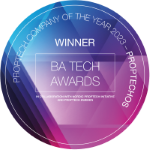Smart facilities management technology is powering the ESG green building revolution that is taking place in the built environment. Our residential, commercial, and industrial buildings are being transformed by advanced software that can utilize and make sense of the vast arrays of data produced by IoT monitoring systems.
As demand grows to meet investor-led ESG targets and improve the industry’s sustainability record, real estate firms and building managers will need to harness smart building technology. According to NAIOP, commercial real estate (CRE) businesses can save up to 15% of their energy costs yearly by using smart building technology to optimize critical systems such as HVAC and lighting.
But how do smart building platforms operate in today’s competitive economic climate, and which systems are best for your CRE business? This article will explain everything you need to know about smart building solutions and how to implement the best tools for your portfolio.
An IoT Platform for Smart Cities
The emergence of smart building technology will benefit not just the commercial world, but also our cities and urban spaces. The global smart cities market was estimated to be worth $748.7 billion in 2023, as UN figures show that 70% of the world’s population will reside in urban areas by 2050.
The ease at which modern buildings and legacy infrastructure can be equipped with IoT sensor technology further accelerates the growth of smart cities. With a portfolio of multiple buildings connected through smart building management systems (BMS), we can connect streets, neighborhoods, and cities into a combined ecosystem with the data we have.
What is a smart system in a building?
Before we look at which smart building systems can best support your portfolio, it’s important to understand how the technology works.
Smart buildings are essentially structures equipped with a network of sensors, devices, and software that collect and analyze data to optimize building operations, enhance occupant comfort, and improve energy efficiency.
Key Components of a Smart Building System:
- Sensors: These devices gather data on various parameters such as temperature, humidity, building occupancy, light levels, air quality, and energy consumption.
- IoT Devices: These devices connect to the building’s network and can control energy management systems like HVAC, lighting, and security.
- Data Collection and Storage: Information from sensors and IoT devices is collected and stored in a central system for analysis.
- Analytics and AI: Advanced algorithms and machine learning process the data to identify patterns, trends, and opportunities for optimization.
- Building Management System (BMS): This system integrates and controls the building management system based on the analyzed data.
- User Interface: This allows occupants and building managers to interact with the system and access information.
The economic benefits of a smart building platform
Smart building infrastructure is not just about procedural efficiency. Sensor-driven technology can also help transform the balance sheet of a commercial real estate organization at a challenging time for office and retail.
According to the American Council for an Energy-Efficient Economy, building automation can yield 10-25% whole-building energy savings, and is likely to pay for itself in 3-5 years. With technology providing real-time data on everything from energy consumption to water waste, spotting areas where gains can be made and money can be saved becomes much easier.
The technology is also an important step in securing key environmental benchmarks such as LEED or BREEAM. Not only do these certifications prove to investors that your organization takes its ESG goals seriously, but studies show that buildings with these benchmarks earn up to 30% more in monthly rents for commercial office space.
The Best Smart Building Platforms
Choosing the best smart building platform for your commercial building portfolio depends on several factors, including the size and type of your buildings, your budget, and your specific needs. Here are some of the most advanced and best-suited smart building platforms for commercial real estate portfolios.
Honeywell Forge
Widely regarded as a market leader in building management solutions, Honeywell’s Forge system is globally renowned for its industrial reliability and resilience in a range of building sizes and uses.
It works best for large-scale operations, with its advanced process control monitoring able to analyze day-to-day operations in huge commercial portfolios, centralizing operations, and making it easier for facility managers to identify problems and maximize ROI on properties.
While it leads the market, the complexity and comprehensiveness of its features may be more than necessary for small and medium enterprises (SMEs).
Siemens Building X
The German conglomerate is another global market leader in building automation for commercial and industrial operations. From critical machinery to digital twins, their systems will be familiar to many in the building industry.
Their state-of-the-art Building X suite was launched in 2022 as a fully integrated, cloud-based smart building platform that claims to act as an ‘antidote to data silos’, connecting all data within a BMS and associated IoT networks to digitize building management and create autonomous, net-zero structures the world over.
Siemens also integrates their Building X platform into its wider BMS platforms, including building automation, fire safety, and asset security.
Sensgreen
The all-in-one smart building platform integrates with a wide range of BMS software systems (including Honeywell and Siemens), and an extensive list of IoT networks. Its scaleable solutions can serve clients of all sizes, from smaller portfolios to multi-national hotel and office managers.
Its flexibility sets it apart in the market for facility managers. Its AI-powered sensors allow users to track the smallest minutiae of operations, all the way down to low paper towel levels in bathrooms. Its predictive maintenance systems reduce demand on support teams and save on repair costs.
Willow
This global tech company has re-imagined the digital twin model to offer a product that acts as the eyes and ears of a building’s operation. It iterates and visualizes the infrastructure’s data as a digital twin, but allows users to compile and store data from all IoT and manual data points.
The software also benefits from AI technology, piecing together real-time data to provide operations teams with the insight to make informed decisions about everything from systems maintenance to interior heating and lighting.
Bisly
Talinn-based Bisly is an emerging player in smart building solutions. While primarily marketed towards residential buildings, its platforms can also serve commercial and hospitality industries. It claims to allow users to save up to 50% of their energy consumption and 80% of their overall operating costs with its cloud-based BMS platform.
Its bank-grade data security puts cybersecurity at the heart of its product. Like others in this article, it serves as an all-in-one suite to manage everything from HVAC to lighting. It can be used in retrofitting projects and integrates with common environmental benchmarks such as WELL and BREEAM to expedite certification.
Harnessing Data and Insights in Today’s Commercial Environment
Managing a complex commercial real estate portfolio in today’s turbulent economy is not always easy, with or without the help of digital smart building platforms.
Investors are putting the real estate industry under increasing pressure to prioritize ESG goals in their decision-making while maintaining profitability. Europe-wide data also reveals a five-year shortage of new-build office construction, suppressing demand at a time when many organizations are rethinking their work attendance policies.
In today’s competitive CRE environment, organizations that can harness data and leverage key insights from smart building platforms to drive meaningful action toward becoming more efficient operations stand a better chance of succeeding. Those who can achieve this while meeting their ESG goals and winning the race to net zero will stand the test of time.
Leveraging Smart Building Insights with ProptechOS
At ProptechOS, we understand the challenges of CRE portfolio managers and their key industry stakeholders in the battle between profitability and sustainability. We pioneered our integrated suite of real estate technology in this spirit so that you can gain control of your property management journey.
Optimize can unlock your building’s potential with portfolio-scale energy and power analytics and up-to-date heating, cooling, and electricity data for each building. Certify draws together digital twins and IoT networks into one place, allowing your business to automate building certification while harnessing building operational insight.
These platforms, combined with the power of digital twins and a joined-up IoT network feeding minute-by-minute data across every building in your network, will allow your business to increase operational efficiency and meet its long-term energy reduction and ESG targets.
Your CRE business can sign up for a free trial of ProptechOS today.

Dr. Erik Wallin
Chief Ecosystem Officer, and founder of ProptechOS and RealEstateCore is recognized as a leader in Building Operating Systems (BOS) and making the buildings of the world smarter. He holds an MSc and a Ph.D. in Media and Computer Science from KTH Royal Institute of Technology.
Read his full bio and information here.

